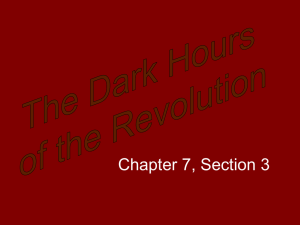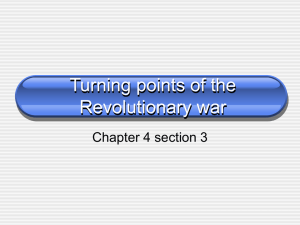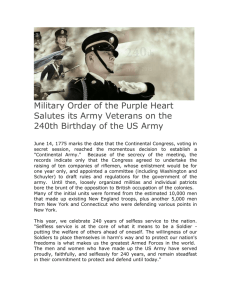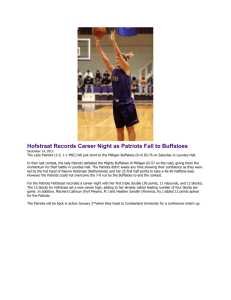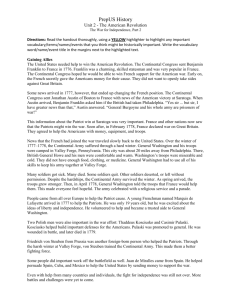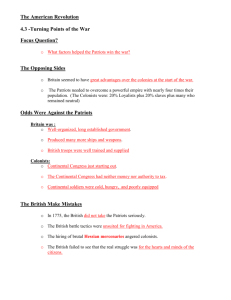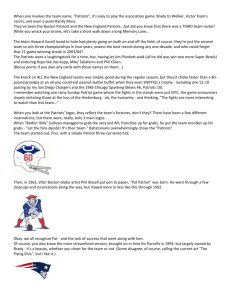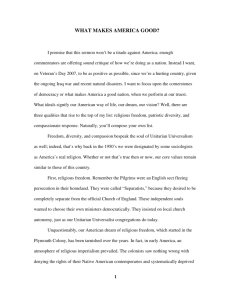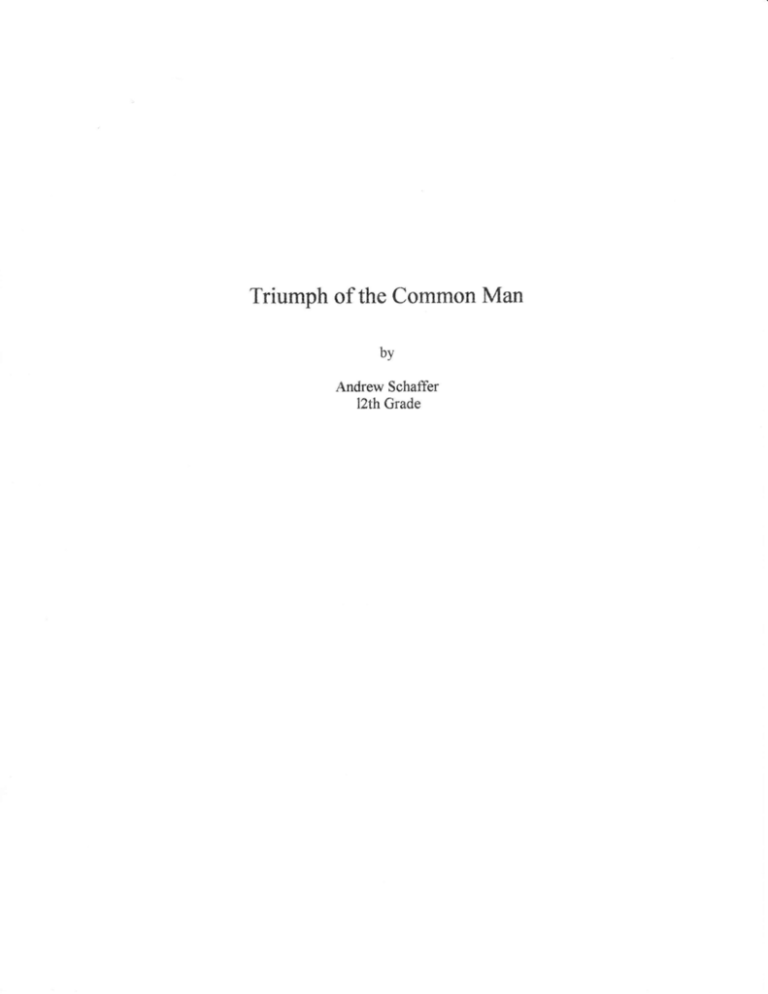
Triumph of the Common Man
Standing fast, despite a second thundering broadside tearing through the hull of the t/SS
Bonhomme Richard, Marine First Lieutenant Richard Dale shouted,
"Fire!" As one the
Richard's guns roared, their cannon shots slicing through the gaining darkness and smoke on
their one-way trip to the HMS Serapis.
Marine Lieutenant Dale and the Marines and sailors with him were the epitome of early
Americans fighting for freedom. Using a converted merchant ship, these courageous souls faced
a
British war frigate rated at 44 guns.l Not only was the British ship better equipped in both the
number and quality ofgung but the men aboard theHMS Serapis weretrained by the most
powerful navy in the world at the time.2 Despite these seemingly long odds, our brave patriots
confidently went on to defeat the HMS Serqis and her crew in a fierce naval engagement.
The soldiers, Marines, sailors, and countless other patriots who fought and died for the
freedom of America and for the principle that "all men are created equal" were ordinary farmers
and tradesmen.3 These simple men lryere the patriots who went down in history because through
their sweat and blood, they made the dream of America areality. A story of triump[ these
common men brought the words of the Declaration of Independence offthe page and into their
own lives, their children's lives, and the lives of every American generation that has followed.
Perhaps nowhere else did these brave men show themselves more of this spirit in one
night than on Ckistmas night of 1776. On that Ckistmas night, many were hundreds of miles
from home and a fierce winter storm made the distance seem all the farther. Enduring these harsh
conditions, men stood, some without shoeg in the snow behind General Washington as they
waited for boats to push through the ice-filled waters of the Delaware River. After crossing the
river, t{re soldiers marched to Trenton with the conditions worsening.o The march took them
straight into the battle of Trenton where the Americans swiftly surprised and then easily defeated
a body
of Hessians guarding the town. They braved these honible conditions to win the day,
raising morale and faith in the army and proving to all - this young nation was determined to win
its independence.
These men fought on despite losing battles, losing friends and retreating with
little more
than threadbare clothing and often without shoes in the winter. Thomas Paine summed up why
these brave men decided to endure hardships when he wrote, "that which we obtain too lightly
we esteem too lightly."5 Paine knew and communicated by fighting for independence; the
benefits of freedom would be well worth whatever price they and their loved ones needed to be
paid5.
Without these brave patriots' sacrifices and suffering, America wouldn't have earned its
independence.
In the long war, there was one winter that embodied this suffering, the winter of 17771778 where the army camped at Valley Forge. The Revolutionary War was looking grim for the
patriots. In the fall of 1777, the British took Philadelphia, and defeated a brilliantly planned,
however poorly executed, surprise attack at Germantown just outside Philadelphia. Once winter
had set
iq
General Washington decided to encamp on high plateau about 20 miles from
Philadelphia in a place called Valley Forge. It was here the problems all started to manifest
themselves. There was a continual lack of food and clothing for the soldiers. For example on
Christmas, they only had fire-cakes, a poor pancake at best, to eat. If the lack of food and
clothing wasn't hard enougtr" disease was rampart in the camp with epidemics of small po*,
dyserrtery and typhus due to the cramped conditions.6 Despite these horrible conditions, the
patriots trained and grew into a cohesive army hardened to win independence for themselves and
fellow countrymen.
Any lesser army would have succumbed to the disease and hardships of that winter.
However the Continental fumy emerged in the spring of 1778 with high morale, capable
of
engaging and forcing a draw with the British army in a regular pitch battle.' Valley Forge is a
testament to the fortitude of our forefathers turning the war in favor of American even after
suffering what is undoubtedly one ofthe wors winters an army has ever endured. This belief in
fighting for freedom is why America remains a gteat nation despite all of the worldly changes.
Whether on land or at seq our forefathers fought and suffered to earn their freedom. These
patriots, although they were just common people, paved the way for the world's greatest
democratic nation.
Today we can envision ourselves standing proudly on the conquered deck of the HMS
Serapis, gazingthrough tieutenant Dale's eyes at the shattered remains of the once great British
frigate, HMS Serapis.
'We
can imagine hearing the entire crew
of
USS Bonhomme
Richard
shouting delightful cheers at the sight of the Serapts lowering her colors, surrendering to a gtoup
of patriots. These cries of victory have echoed America's freedom through 240 years, and
represent its indomitable spirit.
Endnotes
Smith, Charles Richard, and Waterhouse, Charles H., Marirces in the Revolution: A History
the Continental Marines in the American Revolution, 1775-1783. Washington: History and
Museums Division, Headquarters, U.S. Marine Corps, 1975. Print . p.225.
1
of
2Ibid., p.232.
Divine, Robert A., T. H. Breen, George M. Fredrickson, and R. Hal Williams, America, Past
and Present 6ft ed. New York: Pearson Longman, 2003. Print. p. 148.
3
a
McCullough, David, t776.New York: Simon & Schuster,7006.Pirtrt. p.277.
5"Thontos Paine
Quotes."BrainyQuote.com. Xplore lnc,2012. accessed 2 December 2012. Web.
luigiI\\u-b$iryquote.Earuqugtqs
nglrtlrl.
Avery, Fion. "The Story of Vulley Forge." USHistory.org. Independence Hall Association, 2011.
accessed 22 December 2012. Web. lltI"p.i,'n'n'rv.ttshisfatI-algYall,Eytbfge-&l;Lary.u$4ryjtulli
6
' Avery, Pton. "'fhe Story of Valley Farge. " USHistory.org. Independence Hall Association, 2011.
accessed 22 Decernber 2012. Web. hltp:r'i-r]'"wry-ushissilsg*slleylbigs.itufuqu.slat]-bUli

